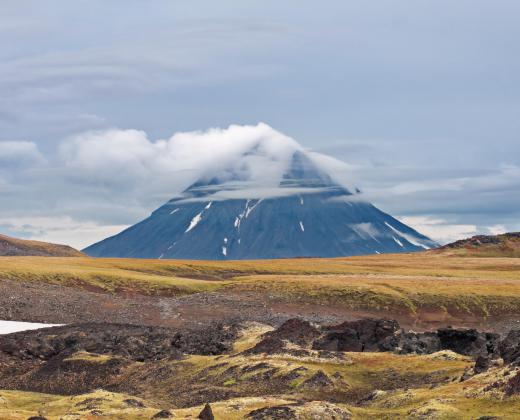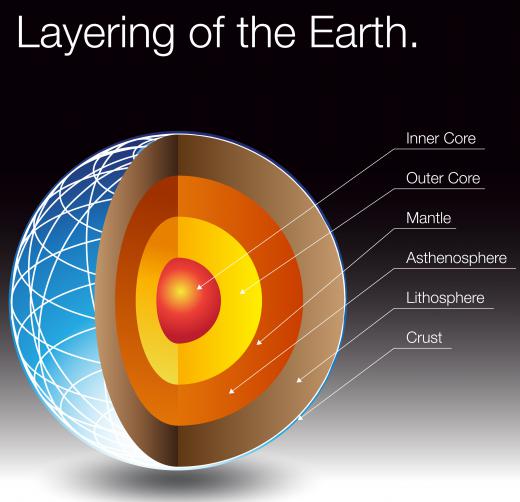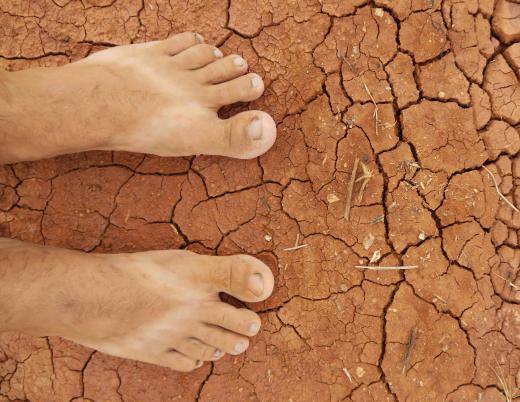What Are the Different Types of Earth Science?
Earth science is a broad term for any branch of science that deals with the study of any part of the Earth, including its environments, climates, and composition. No specific recognized system for classifying earth sciences exists, but there are several general types of earth science that are roughly grouped according to the broader fields into which they fall and which correspond to four area that divide the Earth and its immediate environment: the atmosphere, the lithosphere or geosphere, the biosphere, and the hydrosphere are the domains into which all types of Earth science fall, although some academics recognize two subsets of these spheres as distinct spheres of their own: the cryosphere and the pedosphere.
Chief among the types of earth science are those that study the lithosphere: specifically, geology and associated sciences, which are concerned with the substance that makes up the Earth itself, particularly its rocks and minerals, their structures, and the processes which create, and transform them. Geophysics is another of the most important earth sciences that falls within the field of study of the lithosphere. Geophysics and its sub-disciplines are concerned with the internal forces that shape the earth over millions of years as well as in much more narrow time frames, such as vulcanology, the study of volcanoes, seismology, the study of earthquakes and tectonics, and the study of how the portions of the Earth's crust move and are both created and destroyed over periods of millions of years.

Many other types of earth science are considered to fall within the realm of the lithosphere. Geography, the study of the Earth's surface terrain and features is a well known example. Some other, more specialized earth sciences that study elements of the lithosphere include sedimentology, gemology, minerology, and speleology. The pedosphere, which is sometimes considered to be part of the lithosphere, consists of the Earth's surface soils, their development and transformation. Pedology and edaphology are two branches of earth science concerned with the study of the pedosphere.

The biosphere is the area of the Earth that harbors life. Earth sciences that study elements of the biosphere are not necessarily concerned specifically with the study of life forms in the same way as life sciences, such as biology and botany, but are more concerned with how the history and structure of the Earth has influenced life and its development. Paleontology, the study of extinct species is one well known type of earth science that falls under the domain of the biosphere. Like many other earth sciences, paleontology and associated sciences like micropaleontolgy and palynology have close ties with many life sciences as well as the physical sciences, like chemistry and physics.

Oceanography, hydrology, and limnology are a few of the most well known of the types of earth science that fall under the domain of the hydrosphere sciences. They concern the study of the Earth's oceans and other bodies of water. As with other earth sciences, those who study these disciplines often employ elements of many other earth and life sciences in the pursuit of their chosen specialty. The cryosphere, or the Earth's permanent and seasonal ice masses and their study through the science of glaciology, is sometimes considered to be part of the hydrosphere.

Atmospheric sciences are those that study the Earth's atmosphere. Meteorology and climatology are the primary disciplines within the atmospheric earth sciences. Meteorology is the study of the atmosphere itself, but is most frequently associated with the study of weather and the complex factors that govern it. Climatology is the study of the Earth's climates and is concerned with long-term weather conditions in specific areas.
AS FEATURED ON:
AS FEATURED ON:














Discussion Comments
@MrsPramm - It's true that mining companies hire a lot of earth science majors, but I don't know if they would be the majority. There are plenty of other avenues, including working in government, with urban planning, with national parks, as a researcher in a university and so forth.
If you study soil science you could even end up working on farms or as an environmentalist. I'm pretty sure there are earth scientists involved in current efforts to rehabilitate landfill areas into arable parks for example.
I think a lot of people become a bit jaded when they see how many go into mining, but it's not the only place for earth science in the modern world.
@pastanaga - I don't know if most vulcanologists actually need to go into volcanoes in order to study them. There is more than enough evidence surrounding volcanoes or in extinct or dormant ones for a lot of research.
I think it would be amazing to do research on the mega-volcano that is underneath Yellowstone Park. That has fascinated me ever since I learned it was there. But I suspect most people going into earth science end up working with oil companies. There wouldn't be much money in studying volcanoes.
When I was a kid it seemed like it would be the height of cool to become a volcanologist. I read a couple of books where people had to descend into volcanoes in order to get something done and I loved it when the author would put in lots of detail about what it looked like. I can still remember lots of details about exploding rocks and pumice and gases and all that kind of stuff.
But I realized I probably wasn't going to be brave enough to ever research volcanoes myself. I'm happy to just read about it.
Post your comments